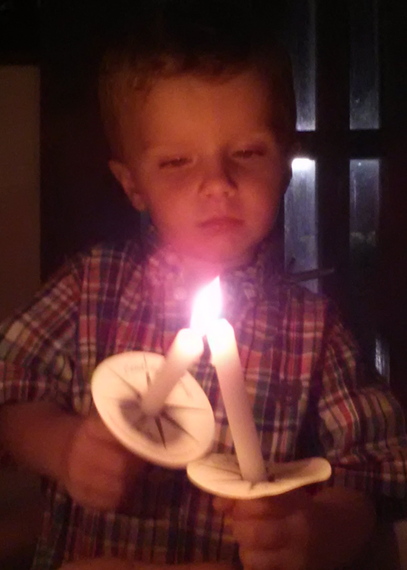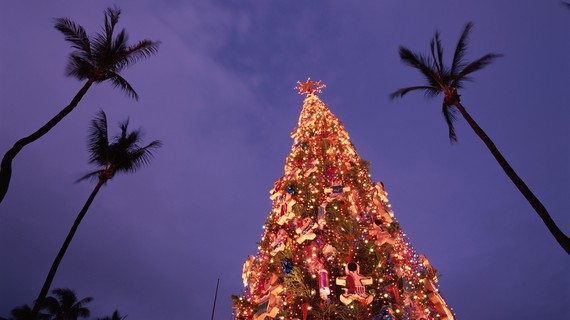Winter 2015 is a season of gathering darkness in far more than the customary sense of shorter days.
It is everywhere.
Mass shootings in our places of study and work and play. Terror attacks abroad, terror attacks at home. Wars that are underway -- and wars that seem impending but only dimly understood, so that we barely know how to protest or avert them.
Then there are the mounting choruses of hate.
Slurs about Syrians and Muslims. Fears of allowing refugees and immigrants into the U.S. Supporters of an U.S. presidential candidate shouting "Sieg Heil! " as security dragged off a Black Lives Matter protester.
This last one -- Americans parroting the slogans of a fascist regime my parents' generation sacrificed so much to defeat -- is horrifying.
Yet, according to traditions old and young, this season is one for festivals of light. Christmas. Hanukkah. Kwanzaa. Diwali. Loi Krathong. And the varied pagan and solstice traditions -- observed in their own right, or mixed and blended with more recent ones.
Having been born and raised Christian in the U.S., I am aware how easy it is to run roughshod over other people's winter celebrations, flattening them into our Christmas preoccupations. ("Yeah, but you light those candles for the baby Jesus!" I once heard a Christian child inform a Jewish one at Hanukkah!)
Still, there is a reason so many peoples and cultures celebrate a world of light as darkness gathers.
At the best, most meaningful margins, we learn and grow stronger by tending to the light that other customs spread.
Last week, when I passed those few homes with lit Hanukkah candles in the window, I felt warmed and fortified. The Hanukkah story is a tale of triumph by an oppressed and outnumbered group. It also is a story of hope, community, faith, and the triumph of light -- light that lasted much longer than the Jews of Assyria had fuel to burn.
From "the other side," a Jewish friend recalls the sense of joy he gained from belting out Christmas songs in grade school. He honored his roots the best way he knew how, going silent on words like "Savior" and "Christ. " Still, he says, the music filled him with authentic wonder; to this day, O Holy Night moves him to tears.
We are not "all the same." But we recognize the sameness of the light within one other and in each other's winter rites.
The light of compassion and love.
The strength to persist in dark times, which is itself an eternal human flame.
* * *
The first time I had to respond as a religious leader to a mass shooting was here in Hawaii on November 2, 1999.
Early that morning, a worker at the Xerox offices opened fire and killed seven coworkers. He fled the scene, then staged a standoff with police outside a nature center just mountainside of Waikiki. School children were effectively trapped inside until his surrender. The entire island was affected, whether we knew the victims or not.
I reached out to other Unitarian Universalist ministers around the nation, seeking advice and solace. But at the time, only one colleague had experience with such an event. His name was Joel Miller, who served as minister to the UU congregation in Columbine, Colorado.
Now, 16 years later, many of my colleagues have responded to school or workplace killings. They responded to the September 11, 2001 terrorist attacks and to the destruction of lives and families wrought by the wars that followed. They responded to police shootings and to the shooting of protestors speaking against police brutality.
It makes me realize what a funny relationship to violence we have in the U.S. There are so many kinds of violence we refuse to see or feel touched by. Rape is treated as a source of shame, a prod to silence. We turn away from domestic violence and child abuse, as if we were made safer by not noticing. And for decades, white communities have chosen not to notice the systemic violence brought against people of color by the very institutions meant to keep us safe.
Many in this country glut themselves on violent television shows, violent movies, violent music, violent games, then easily speak of how all that violence is mere fantasy. Meanwhile, for so many years, we have dwelled in a bubble of seeming national invulnerability, believing that war and terrorism are things that happen elsewhere.
Perhaps that is why we find it so difficult to cope with our new realities?
We are not simply scared that we (or loved ones) could fall prey to acts of random barbarity. We are scared that our sense of safety was never as secure as we made it out to be.
And the response? Somehow, instead of pulling together, Americans are turning on each other with a terrifying ferocity. Sometime "just" with words -- but also, increasingly, with fists or knives or guns.
It is a season of eating our own.
* * *
"The ultimate weakness of violence is that it is a descending spiral, begetting the very thing it seeks to destroy," wrote the Rev. Dr. Martin Luther King, Jr.
"Through violence you may murder the liar, but you cannot murder the lie, nor establish the truth. Through violence you may murder the hater, but you do not murder hate. In fact, violence merely increases hate. So it goes. Returning violence for violence multiplies violence, adding deeper darkness to a night already devoid of stars.
"Darkness cannot drive out darkness: only light can do that. Hate cannot drive out hate: only love can do that."
These last words have been passed around so often as meme, it can be easy to overlook their awesome might.
"Darkness cannot drive out darkness: only light can do that. Hate cannot drive out hate: only love can do that."
Light preached as the only response to encroaching darkness. By a man who was called to understand the darkness of hate better than any of us should ever be.
* * *
We speak of light as a force for good so often and so casually, I fear we forget to wonder what is special about that feeling of light in the first place.
Perhaps that is the universal reminder the winter holidays bring?
Light is special because when we locate that spark of love and hope within ourselves, we feel stronger. We feel steadier. We see the future more clearly by its glow. And we feel more clearly our power to shape it.
Light is special because, when we nurture that spark within our own selves, we see it more readily in others. Sometimes in quick and fleeting ways: that brief smile shared with a stranger that communicates more goodwill than eons of sermonizing could ever do. Sometimes in more durable ones: the knowledge that we can return to friends and family and be embraced, be made stronger, be rekindled.
And light is special because it connects to a force beyond us. Whether we call it God or Goddess or Nature or Creation or the Divine -- there is a force that magnifies the light we find within ourselves.
That force is the star in the sky so bright that it draws people of light and goodwill to one another in a sacred space. It is the candles of pagan ritual that make a brilliant place of wonder and delight within the darkest and most precarious corners of life. It is the unseen energy that lets oil enough to burn for one night instead burn strong and steady for eight.
This is a time of darkness in the world, though it need not be a season of despair.
May this year's season be one of connection and magnification. A time we locate again the spark within ourselves, no matter how fragile. A time we recognize the flame of every courageous heart, of every beautiful and ennobling rite, and feel our own hope grow stronger by their lights.
A season when we welcome in anew the force that carries light into existence, allowing it to fan our collective sense of will, making it stronger than we thought possible -- and letting love and hope prevail against the growing human night.
* * *
First published at Captain Reverend Mother on Friday 18 December 2015.
Need help? In the U.S., callNeed help? In the U.S., call 1-800-799-SAFE (7233) for the National Domestic Violence Hotline. 1-800-656-HOPE for the National Sexual Assault Hotline.

